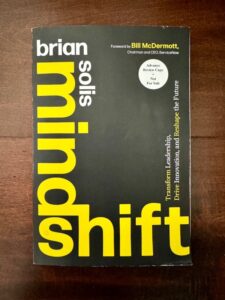
Nike, this may be one of those times when you follow your own slogan.
Every year, I attend the Nike Women’s Marathon in San Francisco to support my wife and my mother who run this incredible event with conviction, passion, and diligence. It’s a privilege, they believe, to participate in a special and dedicated event such as this that celebrates each other as well as the athletic achievement and capabilities of women, past and present.
It’s quite the spectacle and accomplishment to say the very least. Roughly 40,000 people storm Union Square at the crack of dawn to run for everything that inspires them.

This is their time to, “Run Like a Girl,” and in the process, accomplish something that only 1% of the world’s population have ever attempted, the completion of a marathon.
In addition to sharing their personal achievement with friends and family, many participants, and now the greater public, are also sharing and fueling the dispersion of a potentially disruptive story that pits a humble woman against a global brand.
After posting my pictures from the Nike Women’s SF Marathon on flickr, I was pointed to a story that would rouse and move me to respond.

Arien O’Connel, a fifth grade school teacher from New York, ran the fastest time at this year’s Nike Women’s Marathon, 11 minutes faster than any other runner – including the elite – yet, Nike has publicly opted not to recognize her achievement.
Why?
Because she was too humble to think about registering as a Nike elite runner – if that was even an option for her.
Instead of embracing this gift of a PR opportunity, Nike’s public response from Media Relations Manager, Tanya Lopez, sparked a negative public uproar against the race and the corporate brand, forcing the company into a reactionary position of crisis response.
According to Tanya Lopez, “At this point, we’ve declared our winner.”
The public outcry has been incredible and representative of a team simply looking out for one of its own.
Popular running blog Half-Fast ran a very detailed response to Nike’s decision, “Oh, I see. You’ve DECLARED your winner. Well that settles it then. And here I was naïve enough to think that winners were decided based on who had the fastest time, I didn’t realize that the winner could just be declared, as though they were a piece of fruit crossing the border.”
The San Francisco Chronicle also wrote an extensive piece of the would-be Cinderella story and the missed PR opportunity by Nike, “While O’Connell had the greatest run of her life and covered the course faster than any woman, she was told she couldn’t be declared the winner because she didn’t run with the ‘elite’ group who were given a 20-minute head start.”
There’s also a petition circulating the Web to get Nike’s attention.
Before we go any further, let’s get a couple of things out of the way.
I’m not a judge nor an expert on the rules of this marathon.
The debate as to whether she should have declared herself as an elite runner in order to allow other elites to effectively compete against her is moot and inconsequential.
Her time of 2:55:11 is official and is irrefutable – it’s 11 minutes faster than the “official” winner.
This isn’t about the semantics of the classification, re-classification, and division of runners and the methods used for tracking winners.
This is about PR and the public response to a woman who flew across the country to run and support a race that stands for women and their achievements in everything, everywhere. This is about PR, brand cultivation, and community relations.
It’s about perception, because perception, especially in this case, is quickly becoming reality.
It’s about hope.
It’s about recognition.
It’s about doing what many believe is the right thing.
As communicators, there’s much for us to learn here. PR is not simply relegated to press or media relations – especially when the event promotes the inclusion of the greater public. PR is “public” relations, and in that regard, Nike failed to not only promote one of its own, it is potentially crushing the spirit of amateur runners everywhere. Nike is a brand, like all brands, that’s supported, defined, and nurtured by not only strategic marketing, but the customers who choose to embrace it as a participant, ambassador and representative.
It’s opened the door for the public to steer the message and the response. And, with the volume, frequency, and reach of Social Media tools and channels, Nike will be forced into a deep response mode. Unfortunately, this is also an opportunity for competitors such as Adidas, Puma, Reebok, or Converse, to participate, contribute, fuel, and navigate this story into less favorable territories for Nike – assuming that this hasn’t happened already.
I had no choice but to take the conversation to Twitter.

The response was astounding.
Rules are rules, she should have been with the elite group
That’s just WRONG and damned straight Nike should do something about it! I’ll not buy a NIKE PRODUCT unless/until they do!
Woah. After (hopefully) seeing that, the elite winners should give her the gold, and swap their medals accordingly. WTF Nike?
Wow – that wasn’t right what Nike did at all. That’s very disappointing to read.
WTF? It seems pretty clear to me that the woman deserves to be recognized for her accomplishment. I hate loop holes!
Nike should stick with their marathon results but make huge deal out of Arien having the fastest time, put her in a commercial
The responses continue page after page, with only one speaking out in support of Nike (the first example above).

Shot shortly before Arien O’Connell crossed the finish line
To help Nike, I’ve outlined a few simple steps to shift public perception and recognize Arien, without taking away from the accomplishments and recognition of the elites, in the process:
At this point, Nike must use the very channels that are working against it. The Social Web can help turn the tide for the company to embrace and engender support and empathy for Arien O’Connell and the Nike brand.
How?
Start by publicly acknowledging her achievement and create something that officially awards her as a “non-elite” or simply as a regular person who set out to embody the Nike slogan, “Just Do It.”
Encompassing change can be good.
Announce this recognition and “award” using traditional tools such as email, a press release, a statement on the Nike Women’s Marathon site, and also through prepared customer service responses (I’m sure the inbound responses have become increasingly louder, probably deafening.)
Fly her to Nike HQ or send a crew to New York. Shoot a video ceremony. Release it on the Web. Send it to everyone who has publicly called on Nike to do the right thing. Transform the media organization into a public outreach team to ensure that the groundswell shifts to support Ariel and Nike together. Invite her to become an elite runner and feature her on stage before next year’s event.
Create a commercial around her and the thousands of others who participate in Nike Marathons that highlight the reality that we can, as regular people, become elites. It is a true Cinderella story, one that only inspires a community to participate instead of dividing it.
Make her the champion for the rest of us! Just Do It, just like Arien did!
By all accounts, this story demonstrates why PR must always be on guard and ready for an opportunity to shine – to shape perception and channel emotions in a positive and productive way. This is about celebration and rallying support within a community – the difference between PR and true public relations and the difference between proactive community engagement and empowerment and crises response, damage control and communications.
We all have the ability to become “Arien’s” in our own right. All we need is support, inspiration, and the ability to shine!
UPDATE: Nike is announcing that it recognizes Arien O’Connell as the winner with the fastest chip time.
In an email response to someone who was unhappy with Nike, one of many I imagine, the company responded officially with:
Hello,
Nike is announcing today that it recognizes Arien O’Connell as a winner in last weekend’s Nike Women’s Marathon with the fastest chip time, completing the full race in 2:55:11. She shattered her previous time and achieved an amazing accomplishment.
Arien will receive the same recognition and prize, including a Tiffany bowl, the full marathon elite group winner received. Arien was unfortunately not immediately recognized as a race winner because she did not start the race with the elite running group, which is required by USATF standards.
Because of their earlier start time, the runners in the elite group had no knowledge of the outstanding race Arien was running and could not adjust their strategies accordingly.
Learning from the unique experience in this year’s race, Nike has decided today to eliminate the elite running group from future Nike Women’s Marathons. Next year, all runners will run in the same group and all will be eligible to win.
Nike has a proven track record of supporting athletes and we’re proud to be able to honor Arien and other athletes who surpass their goals and achieve great accomplishments.
Crisis Communications 2.0 Series:
Apple and the iPhone Price Bomb
The Skype is Falling
Microsoft PR Sparks a Blogstorm with Acer Ferrari’s and Vista





So what did this woman do wrong?
I’m impressed with Nike’s response – it was honest, diplomatic and humble. I appreciate the way they acknowledged Arien’s achievement without discounting the value of structured competition. Here’s to an elite-free run next year!
I’m just wondering how the “elite” runners will feel. I know they have this division for a number of reasons. Regardless, Nike’s response was appropriate and necessary.
Brian,
You left out an operative question:
Were the elite group required to wear Nike products and was Arien wearing Nike products?
The answer to this would go a long way towards explaining their motivation in sticking with this extraordinarily tone deaf PR mess.
Excellent and thorough overview of the situation and response Brian. Thanks so much for sharing. I agree that the recognition HAS to be there especially with an achievement this monumental and I’m glad Nike stepped up to the plate. Great coverage.
Thanks-
Brian – brilliant analysis and recommendations. Good to see that Nike did the right thing.
Congratulations to your wife and mother for taking the challenge and running the race. Great pictures, as always.
Hey Brian: Glad you chose to run with this; and that your advocacy apparently nudged along a positive outcome. (jackdawsonsf) 🙂
Hi Brian,
It’s too bad Nike had to get reamed out before the company figured out it needed to do right by Arien O’Connel and do the right thing. This is a classic example of a company that defined and followed a strategy without first taking the time to listen and engage its customers.
Best,
Daria
Brian, I had caught wind of a few of the tweets, but your post made it all make sense. Thanks for a great overview, analysis and follow-up. In the end I am glad to see Nike make the right choice, acting fairly to both sides by not taking away from the “Elite” winner, explain the logic behind the rules and their initial decision, and making adjustments to their thinking so a similar result is avoided in the future. I’d like to think the quick and wide social media response helped push them toward doing the right thing. While I am pleased with Nike, I’m still not giving up my Chuck Taylors! 😉
My first thought was the same as Martin’s. How embarrassing is it to Nike if their elite runners were decked out in Nike gear and the amateur beat them with a competitor’s equipment? It is hard to cut a “Just Do It” ad with someone wearing Asics.
While their response was nice, I bet that’s all we hear from them.
Nike has made her “a winner”. She is not “a winner”, she is “THE winner”!
I guess “Just Do It” refers to the “Elite”.
No more Nikes or Converse for me!
Part of this is stemmed from a misunderstanding as to how marathon’s are raced. The goal of a marathon runner is not so much to run the fastest time but simply to run faster than her peers. So, you will often have world class marathon runners completing races much slower than their personal bests, but that is all that was needed to win.
With this being said, Nike was correct in not initially recognizing her as a winner, as there was a possibility that the original winner might have raced faster with Adrien’s presence. However, due to individuals unfamiliar with the event, as is often the case with many other matters, people have raised a commotion over it.
I think this is an important example of how people should understand the context in which an event occurs, before passing judgment on it. Not everything occurs at face value.
From a PR perspective, that is a different story, as it’s their job to manage the ignorance of the people.
This kind of knee jerk reaction reflects the armpit of America today. Seemingly forgetting all of the benefit this event brings to so many thousands of people and turning that into “lets get ’em!” “Yea Nike sucks!”
She deserves the recognition but if you are going to burn energy like this use it for cancer or something more productive.
If it wasn’t for Nike you would have been running by yourself last weekend.
Good grief. Tanya you managed to turn a great PR opportunity into a major disaster. Nike should fire this woman immediately and hire someone who actually can think.
My guess is that she is symptomatic of the typical mid-20 to late twenty Jennifers who “do” PR. They are basically event planners who have no media experience and don’t really have a clue about PR. If this woman did, she would not have screwed this up so bad. And Nike, you need to get a clue as a company.
I actually the email that Nike sent at the end of this really sounded kind of grudging. Having done marathons before the elite start is something that I think that most have and I have never heard of them having any issues like this.
So I am not convinced that the solution is to get rid of the elite start.
The solution is of course to award the fastest runner regardless of what category they choose to run in.
I would like to point out the biggest issue in this whole mess. It has to do with the USATF rules. According to these rules “chip times” (the net time given between the time a person crosses the start line to the time they cross the finish line) is not an official time. Instead, the “clock time” (time from the start of the race until the person crosses the finish line) is the official time. Thus, in this case Arien’s official time was 20 minutes slower than her chip time. So, by the official rules she did not win the race. That being said, I think Nike has done the right thing by recognizing her excellent run and also by eliminating the separate elite race. This way any amateur will have a chance to win as all times can be considered official.